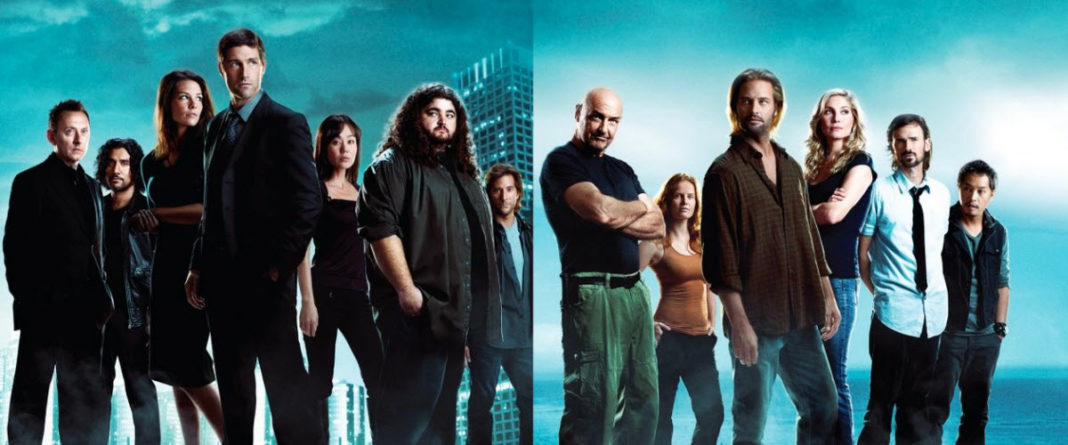The first episode of season 5 of Lost begins, as most episodes do, with a ‘previously on’ sequence. It establishes that a group of plane crash survivors have made it off of an island. It reveals that one of them is a killer; one of them lives in a mental hospital; one of them has an insane beard and thinks they need to go back. A woman and an older man talk about the island and how other people have left it. The guy with the beard talks to another, kind of squirrely-looking guy, who says they need to take the bald man in the casket next to them back to the island.
This was the first thirty seconds of Lost I ever saw. Before the hour was over, I would be hooked.
I’d been aware of Lost before I started watching it. I don’t know how I would’ve lived in the world between 2004 and 2008 and not been aware of Lost. I knew very little about it beyond ‘A plane crashed on an island,’ though. I may also have known there were polar bears, but I don’t think I knew there was a smoke monster. I also knew there were people called “The Others” because of a reference to it in an episode of The Office. I was a different person then, twenty-six years old and with a tendency to avoid pieces of pop culture the more hype they had around them. Maybe I’d been burned by watching Donnie Darko in college and not seeing what all the fuss was about. Maybe I was worried it wouldn’t live up to my expectations. Maybe I was just an asshole.
I started watching Lost with its fifth season premiere because the woman I had been dating for six months at the time was into it, and if I wanted to spend time with her on Wednesday nights it meant I had to watch Lost with her. Her rule for watching Lost was fairly simple: no talking while the show was on. Talking during commercials was fine, but if the show was in progress, mouths were shut. This was the same rule she set in place for watching The Office, and I found it to be a reasonable one. We employ the same rule today, however unspoken, for shows like The Good Place, and it seems to be working well for us.
The main thing that the fifth season premiere of Lost had going for it, and that made me a convert pretty quickly, was something I would later learn is a somewhat divisive topic for Lost fans: the time travel. The show, I would learn, had always jumped back and forth narratively in time, but this season made time travel an actual plot point, which astonished and delighted me. For one thing, I couldn’t believe this was happening on a show on network television, much less a show as popular as I knew the series was at that point. For another, I’ve always been a sucker for a good time travel story, and the seemingly random nature of the time travel in that first episode was wildly intriguing. I also learned that the island could be moved, which, to be honest, still doesn’t really make any sense to me ten years later, but I rolled with it. When one of the characters casually mentioned having to push a button every 108 minutes to save the world, I thought it was the most Grant Morrison thing I’d ever heard on television up until that point. A lifetime of reading comics had prepared me for Lost.
I watched the rest of the fifth season as it aired, and I got to know the characters. The Sawyer I grew attached to was not the lovable asshole of the early seasons, but the settled-down head of security for the Dharma Initiative who went by LeFleur and was in a relationship with Juliet (#suliet). I became engrossed by the mythology of the island, baffled by the apparent immortality of Richard Alpert, and desperate to know whatever the hell Jacob’s deal was. There were things that were lost on me, sure—references to characters long dead or to story elements that were crucial that I just didn’t have the background on. But those gaps just made me hungrier and more interested in both what was going to happen and what had come before.
When I went back and watched the first four seasons of the show following the end of the fifth season, they were almost a letdown. The button they pushed to save the world was just a key on a keyboard. There was no time travel in this show at all, and we barely ever got to see the smoke monster. There were some fun surprises, too. The way Benjamin Linus was introduced in the show’s second season was entirely unexpected and really delightful to watch play out knowing what I knew about Ben’s future. And I met a lot of characters who I knew were no longer on the show, even if I didn’t know the way in which they would leave, which added extra weight to their scenes.
There’s a saying in comics that every issue is someone’s first. The same is true for television, though I think we tend not to think of it that way anymore. With entire seasons of just about any show imaginable available to stream, the idea of jumping into something mid-run feels old-fashioned. I know I’ve occasionally been discouraged from starting a series I’ve heard is good because ‘there’s too much to catch up on’ or ‘I’m just so far behind.’ I came to Lost at a time when that wasn’t as much of a concern, or was just starting to become one, and my experience of watching the series the way I did is a singular one that I wouldn’t trade for the world.












Great. Now I want to re-watch Lost again. THANKS JOE.
Comments are closed.